Events Archive

Humanities Informatics Lab Final Showcase: Surveillance and Infrastructure
September 17, 2020
Webinar | 4:00 pm - 5:15 pmHumanities Informatics Lab Final Showcase: Surveillance and Infrastructure
September 17, 2020
Webinar | 4:00 pm - 5:15 pmThe Surveillance & Infrastructure research group explores the convergence of surveillance and sociotechnical infrastructures, particularly in the technologies, techniques, and networks used for gathering information about differentiated populations. We take an interdisciplinary approach to these topics, from the impact of surveillant technologies on culture, “militainment,” the civilian and domestic origin and application of military technologies, and the role of distribution networks in filtering and disseminating culture and information, to the histories and techniques of surveillance, among other topics.
Panel:
Elizabeth Ellcessor, Associate Professor of Media Studies: "Personal Alarms: Intimacy and Oversight in the Name of Safety"
Camilla Fojas, Professor and Department Chair of Media Studies: "Drone Futures"
Natasha Heller, Associate Professor of Religious Studies: "Face Masks and Mass Surveillance"
Debjani Ganguly, Professor of English and Director of the IHGC, Moderator

José Torres-Tama, "Performance Art & Social Change: The Artist as Provocateur"
September 14, 2020
Webinar | 7:00 pmJosé Torres-Tama, "Performance Art & Social Change: The Artist as Provocateur"
September 14, 2020
Webinar | 7:00 pmLive art lecture on José Torres-Tama's documentary theater process for empowering and chronicling the voices of undocumented immigrant communities and marginalized communities of color.
This event is part of the following series:
CYBER RESIDENCY ON PERFORMANCE ART AND SOCIAL CHANGE
with José Torres-Tama
online September 14-19, 2020
presented by the University of Virginia Department of Drama with support from the IHGC Lab in Performance Cultures & Embodied Creative Practices
A weeklong series of online work sessions and performances with award-winning Torres-Tama, who uses visual and performance art to explore the effects of mass media on race relations, the “North American Dream” mythology, and anti-immigrant hysteria.

Antigone Film Series: Germany in Autumn
September 11, 2020
Webinar | 7:00 PMAntigone Film Series: Germany in Autumn
September 11, 2020
Webinar | 7:00 PM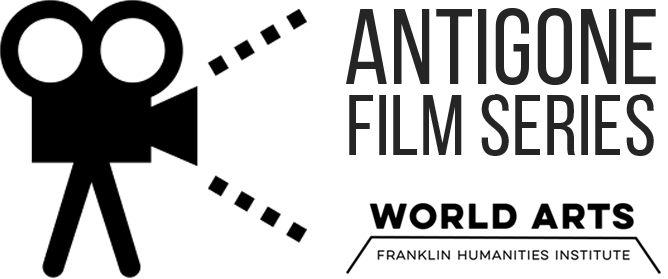
You are invited to join the Franklin Humanities Institute and Screen/Society for the first film in the Antigone Film Series!
Germany in Autumn (Deutschland im Herbst)
Alexander Kluge and Beate Mainka-Jellinghaus, 1978
PLEASE REGISTER HERE
Stream link: https://www.twitch.tv/screensociety
Germany in Autumn is a montage film including segments from 11 directors, all of which reflect on the tragic events of autumn 1977, when ex-SS public official Hanns Martin Schleyer was kidnapped and murdered by the Red Army Faction (aka Baader-Meinhof group), 3 of whose members mysteriously died in prison. Opening with the official burial of Schleyer and ending with the police-interrupted burial of the Red Army Faction members, the film as a whole is structured by the differential burials to which the “friend” and “enemy” of the state are subjected. Germany in Autumn thus echoes the differential burial to which Creon subjects Eteocles and Polyneices in Sophocles’ ancient tragedy, Antigone. Yet Antigone makes more than one appearance in Germany in Autumn. On the one hand, Fassbinder replays the agon between Creon and Antigone in his own confrontation of his mother’s support for the dictatorship. On the other hand, Volker Schlöndorff’s segment forces the ancient tragedy to become comic, in order to circumvent the authoritarian censure of trying to critically visit Germany’s fascist past and its liberal afterlife.
Introduced by Stefani Englestein
Professor and Chair of German Studies
Duke University
Followed by Zoom discussion
Relevant publications:
Sibling Action: The Genealogical Structure of Modernity. New York: Columbia University Press. 2017.
“Sibling Logic; or, Antigone Again.” PMLA Vol. 12, No. 6 (2011): 38-54.
This series is cosponsored by Art, Art History, and Visual Studies; Classical Studies; English; International Comparative Studies; Literature; and Duke Arts. Additional cosponsors include the Institute of the Humanities and Global Cultures at the University of Virginia and the Academy of Global Humanities and Critical Theory, a research entity jointly promoted by the University of Virginia, Duke University and the University of Bologna. The screening of Germany in Autumn is cosponsored by German Studies.
Other films in this online/streaming series:
- Thu Oct 8, 7pm: The Three Burials of Melquiades Estrada (Tommy Lee Jones, 2005)
- Thu Oct 29, 7pm: The Milk of Sorrow (La Teta Asustada) (Claudia Llosa, 2009)
- Thu Nov 12, 7pm: Phantoms of Lovanium (Les fantômes de Lovanium)

Humanities Informatics Lab Final Showcase: Human and Machine Intelligence
September 9, 2020
Webinar | 12:15 pm - 1:30 pmHumanities Informatics Lab Final Showcase: Human and Machine Intelligence
September 9, 2020
Webinar | 12:15 pm - 1:30 pmThe Human and Machine Intelligence Group was formed three years ago with a few interested participants. It now has over 100 members with a mixture of faculty, graduate students, undergraduate students, and external members, drawn from nine of UVA's twelve schools. It has hosted more than 65 speakers from 16 universities and research institutes. The Showcase panel features three or our members discussing their HMI related research ranging from Law, through Statistics to Economics. The talks are aimed at a broad audience.
Panel:
Ashley Deeks, The E. James Kelly, Jr. Class of 1965 Research Professor of Law: “Predicting Enemies”
Anton Korinek, Associate Professor of Economics: “AI and the Future of Work”
Dan Spitzner, Associate Professor of Statistics: “Socially-Inclusive Foundations of Statistics”
Jack Chen, Associate Professor of Chinese Literature, moderator

Mellon Fellows Seminar - Fotini Kondyli, "Citizen Participation and Urban Planning in Byzantine Athens"
September 4, 2020
Webinar | 10:00 am - 12:00 pmMellon Fellows Seminar - Fotini Kondyli, "Citizen Participation and Urban Planning in Byzantine Athens"
September 4, 2020
Webinar | 10:00 am - 12:00 pmFotini Kondyli (Assistant Professor of Byzantine Art and Archaeology) is a Byzantine archaeologist who works on the Late Antique, Byzantine and Frankish periods. Her research interests include the construction of Byzantine spaces, communal identity, landscape and household archaeology and the archaeology of Byzantine non-elites. She also works on cultural, economic and political networks in the Eastern Mediterranean in the Late Byzantine period (13th- 15th c.). She is presently writing her first monograph on aspects of vulnerability and resilience of Late Byzantine rural societies, focusing on the spatial organization and socio-economic strategies of non-elite groups in response to economic and demographic crises. Her work brings together archaeology, archival research, spatial analysis, and the digital humanities.
Register here for Dr. Kondyli's seminar.

Humanities Informatics - Symposium and Exhibition
April 3, 2020
TBD | TBDHumanities Informatics - Symposium and Exhibition
April 3, 2020
TBD | TBD
Cristiana Facchini, "Questioning God: Jewish and Christian Theologies after Auschwitz"
April 1, 2020
Wilson Hall 142 | TBDCristiana Facchini, "Questioning God: Jewish and Christian Theologies after Auschwitz"
April 1, 2020
Wilson Hall 142 | TBDCristiana Facchini is an Associate Professor at the University of Bologna and Fellow at the Max Weber Center for Advanced Cultural and Social Studies of the University of Erfurt. She has studied in Bologna and specialized in Oxford and Jerusalem. She earned her PhD in Jewish Studies at University of Turin. She has been awarded many fellowship and grants, while pursuing her research in Paris, Budapest, New York and Berlin. She extensively wrote on history and theories of religions, with special regards both to Christianity and Judaism. In Bologna she has taught a wide range of courses, such as Theories of Religions, Comparative Religions, History of Judaism, Jewish Studies, Biblical Hebrew, Modern History, and History of Western Christianity. In 2015 she was one of the keynote speakers of the XXI IAHR World Congress. In 2018 she received the Italian National Scientific Qualification (ASN) for Full Professor in Early Modern History (11/A2) and History of Christianity & Religious Studies (11/A4).

CANCELLED: Sarah Nuttall, "Pluvial Time and the Novel Form"
March 16, 2020
Bryan Hall Faculty Lounge | 5:00 pm - 6:30 pmCANCELLED: Sarah Nuttall, "Pluvial Time and the Novel Form"
March 16, 2020
Bryan Hall Faculty Lounge | 5:00 pm - 6:30 pmSarah Nuttall is Professor of Literary and Cultural Studies and Director of WiSER (Wits Institute for Social and Economic Research) in Johannesburg, South Africa. She is the author of Entanglement: Literary and Cultural Reflections on Postapartheid, editor of Beautiful/Ugly: African and Diaspora Aesthetics, and co-editor of many books including Negotiating the Past: The Making of Memory in South Africa; Senses of Culture; Johannesburg: The Elusive Metropolis and Loadshedding: Writing On and Over the Edge of South Africa. Recent essays include ‘Mandela’s Mortality’; ‘Secrecy’s Softwares’; ‘Surface, Depth and the Autobiographical Act’; ‘The Redistributed University’; and ‘The Earth as a Prison?’ She has given more than thirty keynote addresses around the world, and published more than sixty journal articles and book chapters. Her work is widely cited across many disciplines. She has taught at Yale and Duke Universities and in 2016 she was an Oppenheimer Fellow at the DuBois Institute at Harvard University. For seven years she has directed WiSER, the largest and most established Humanities Institute across the Global South.

Amitav Ghosh, Seminar & Workshop Series on "Indian Ocean and Climate Change"
March 16, 2020
Wilson Hall 142 |Amitav Ghosh, Seminar & Workshop Series on "Indian Ocean and Climate Change"
March 16, 2020
Wilson Hall 142 |The Indian Ocean in the Anthropocene
Seminar conveners: Amitav Ghosh and Debjani Ganguly
March 18 (Wed), 27(Fri)
April 2 (Thurs), 10 (Fri)
Hosted by the IHGC and the Mellon Global South Lab
Time/Venue: 3.00-5.00pm, Wilson 142
As the impact of climate change intensifies, it is becoming increasingly clear that the Indian Ocean region, with its fast-accelerating economies, its innumerable oil and gas producers, its collapsing ecosystems, its vulnerable yet rapidly-increasing populations, and its swiftly-expanding carbon footprint, will be the theatre in which the future of the world will be decided. How will the ongoing changes affect the material and cultural lives of the region’s peoples, who are simultaneously drivers and victims of climate change? Many of the world’s major zones of conflict are already clustered around the Indian Ocean, and the region is also the theater of many accelerating arms races. How will these developments affect the global balance of power? What lessons might past climatic shifts offer for the future? These are some of the issues that will be discussed over the four two-hour sessions of this seminar.
March 18: Indian Ocean Worlds and the Anthropocene
March 27: The Little Ice Age in Tokugawa Japan and Mughal India: Early Modern Perspectives
April 2: The Arts of Living in a Precarious Age
April 10: Environmental Crisis and Security in the Indian Ocean
Visiting scholars Sunil Amrith (Harvard), Julia Adeney Thomas (Notre Dame) and Anand Pandian (Johns Hopkins) will participate in some of the sessions.
Approximately 3-4 readings will be assigned per session. The seminar will be capped at 25 participants, and readings will be circulated by the end of February to selected participants. Please register here if you are interested. The call closes on February 24, 2020.

Deborah Baker, Seminar & Workshop on "Narrative in the Age of Political Extremism"
March 16, 2020
Wilson Hall 142 |Deborah Baker, Seminar & Workshop on "Narrative in the Age of Political Extremism"
March 16, 2020
Wilson Hall 142 |Spring Seminar with IHGC Distinguished Writer-in-Residence, Deborah Baker
“Narrative in the Age of Political Extremism”
March 16 (Mon), March 23 (Mon),
March 30 (Mon) and April 6 (Mon)
Time: 3.00-5.00pm
Venue: Wilson 142
(except for March 16 - Wilson 117)
We are living in a time of rising extremism and increasing polarization around the world. This trend has been accompanied by acts of millenarian terror, generally committed by men who believe themselves and their identities and beliefs to be facing an existential threat. What narrative strategies can be used to dramatize the conflict between those who want to destroy civil society, replacing civic norms with ones in which they are the unquestioned arbiters, and those who seek to protect the status quo? In this seminar we will look at works of fiction and narrative non-fiction that have captured this struggle in all its moral, political, and historical dimensions.
Reading list:
The Convert by Deborah Baker (narrative non-fiction)
One of Us: The Story of a Massacre in Norway by Asne Sierstad (narrative non-fiction)
American War by Omar el Akkad (futurist fiction)
The Plot Against America by Philip Roth (speculative fiction)
Defying Hitler by Sebastien Haffner (posthumous memoir)
The seminar will be capped at 20 participants, and the books will be provided to all, either as digital copies or in print, by the end of February 2020. The call will close on February 24.
Please register here:
https://docs.google.com/forms/d/e/1FAIpQLSeTmkTo-rUiQnqu39exnL9O1-U-qM_S0u3QelZ1joJTrD2CVw/viewform
Bio: Deborah Baker was born in Charlottesville and grew up in Virginia, Puerto Rico and New England. She attended the University of Virginia and the University of Cambridge. Her first biography, written in college, was Making a Farm: The Life of Robert Bly, published by Beacon Press in 1982. After working a number of years as a book editor and publisher, in 1990 she moved to Calcutta where she wrote In Extremis; The Life of Laura Riding. Published by Grove Press and Hamish Hamilton in the UK, it was shortlisted for the Pulitzer Prize in Biography in 1994. Her third book, A Blue Hand: The Beats in India was published by Penguin Press USA and Penguin India in 2008. In 2008–2009 she was a Fellow at the Dorothy and Lewis C. Cullman Center for Writers and Scholars at The New York Public Library. There she researched and wrote The Convert: A Tale of Exile and Extremism, a narrative account of the life of an American convert to Islam, drawn on letters on deposit in the library’s manuscript division. The Convert, published by Graywolf and Penguin India, was a finalist for the 2011 National Book Award in Non-Fiction. In August 2018, Baker published her fifth work of non-fiction, The Last Englishmen: Love, War and the End of Empire. She has two children and is married to the writer Amitav Ghosh. They divide their time between Brooklyn and Goa.

Aswin Punathambekar, "Sound Art and Escape Routes to New Public Spheres"
February 28, 2020
Wilson Hall 142 | 10:30 am - 12:00 pmAswin Punathambekar, "Sound Art and Escape Routes to New Public Spheres"
February 28, 2020
Wilson Hall 142 | 10:30 am - 12:00 pm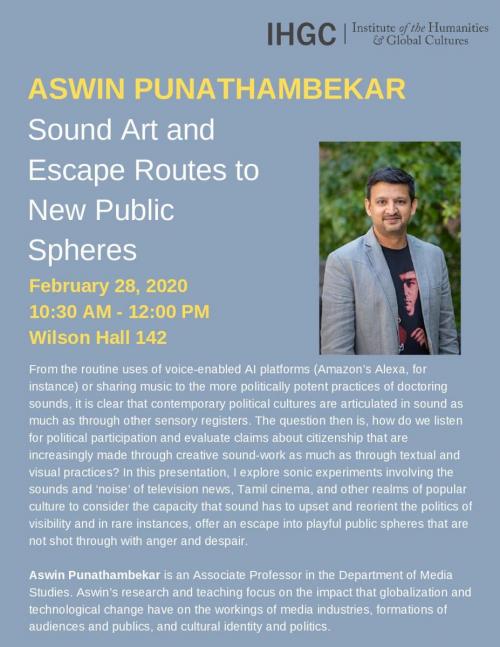

Caroline Elkins, "The ‘Moral Effect’ of Legalized Lawlessness in the British Empire" (convened by Erik Linstrum)
February 27, 2020
Wilson Hall 142 | 4:00 p.m. - 5:30 p.m.Caroline Elkins, "The ‘Moral Effect’ of Legalized Lawlessness in the British Empire" (convened by Erik Linstrum)
February 27, 2020
Wilson Hall 142 | 4:00 p.m. - 5:30 p.m.Professor Elkins's first book, Imperial Reckoning: The Untold Story of Britain's Gulag in Kenya, was awarded the 2006 Pulitzer Prize for General Non-Fiction. It was also selected as one of the Economist's best history books for 2005, was a New York Times editor's choice, and was a finalist for the Lionel Gelber Award. She and her research were also the subjects of a 2002 BBC documentary titled, Kenya: White Terror, which was awarded the International Committee of the Red Cross Award at the Monte Carlos Film Festival. Professor Elkins is a contributor to The New York Times Book Review, The Atlantic, and The New Republic. She has also appeared on numerous radio and television programs including NPR's All Things Considered, BBC's The World, and PBS's Charlie Rose. Professor Elkins's current research interests include colonial violence and post-conflict reconciliation in Africa, and violence and the decline of the British Empire. She is currently working on two projects: one examining the effects of violence and amnesia on local communities and nation-building in post-independent Kenya; the other analyzing British counter-insurgency operations after the Second World War, with case studies including Palestine, Malaya, Kenya, Cyprus, and Nyasaland. Professor Elkins teaches courses on modern Africa, protest in East Africa, human rights in Africa, and British colonial violence in the 20th century.
Imperial Reckoning: The Untold Story of Britain's Gulag in Kenya, was awarded the 2006 Pulitzer Prize for General Non-Fiction. It was also selected as one of the Economist's best history books for 2005, was a New York Times editor's choice, and was a finalist for the Lionel Gelber Award. She and her research were also the subjects of a 2002 BBC documentary titled, Kenya: White Terror, which was awarded the International Committee of the Red Cross Award at the Monte Carlos Film Festival. Professor Elkins is a contributor to The New York Times Book Review, The Atlantic, and The New Republic. She has also appeared on numerous radio and television programs including NPR's All Things Considered, BBC's The World, and PBS's Charlie Rose. Professor Elkins's current research interests include colonial violence and post-conflict reconciliation in Africa, and violence and the decline of the British Empire. She is currently working on two projects: one examining the effects of violence and amnesia on local communities and nation-building in post-independent Kenya; the other analyzing British counter-insurgency operations after the Second World War, with case studies including Palestine, Malaya, Kenya, Cyprus, and Nyasaland. Professor Elkins teaches courses on modern Africa, protest in East Africa, human rights in Africa, and British colonial violence in the 20th century.

Humanities Week 2020 | HistoREMIX
February 23, 2020
Humanities Week 2020 | HistoREMIX
February 23, 2020

HistoryREMIX is the theme of this year's Humanities Week, and undergraduate-led series of events sponsored by the IHGC. Visit the Humanities Week homepage for further details.

Mellon Fellows Seminar - Katelyn Hale Wood, "Listening Backwards: Archiving Laughter and Queer Sonic Intimacies"
February 7, 2020
Wilson Hall 142 | 10:30 am - 12:00 pmMellon Fellows Seminar - Katelyn Hale Wood, "Listening Backwards: Archiving Laughter and Queer Sonic Intimacies"
February 7, 2020
Wilson Hall 142 | 10:30 am - 12:00 pmKatelyn Hale Wood is a performance studies scholar and theatre historian whose research engages the intersections of critical race and queer theory, gender studies, and 20th/21st century comedic performance. Her first book project, tentatively titled Modalities of Freedom: Black Feminist Comedic Performance in 20th and 21st Century USA, argues how the work of Black feminist stand-up comedians have played vital roles in queer, feminist, and anti-racist community building. Her work has been published in Theatre Topics, QED: A Journal in GLTBQ Worldmaking, and Departures in Critical Qualitative Research, and has also been supported by the American Society for Theatre Research and the National Center for Institutional Diversity.
Wood received her Ph.D. in Theatre History and Criticism with an emphasis in African American Studies from the University of Texas at Austin (2014). Prior to joining the faculty at UVA, she taught in the Theatre History and Theory program at Miami University. Alongside her scholarship, Wood is also a dramaturge.
At UVA, Wood teaches courses in theatre history, performance theory, as well as interdisciplinary topics, such as race and performance in the Americas, queer and feminist performance in the U.S., and comedy as protest.

Information Session for 2020 Summer School of the Academy of Global Humanities and Critical Theory at the University of Bologna
February 7, 2020
Wilson Hall 142 | 1:00 - 2:00 p.m.Information Session for 2020 Summer School of the Academy of Global Humanities and Critical Theory at the University of Bologna
February 7, 2020
Wilson Hall 142 | 1:00 - 2:00 p.m.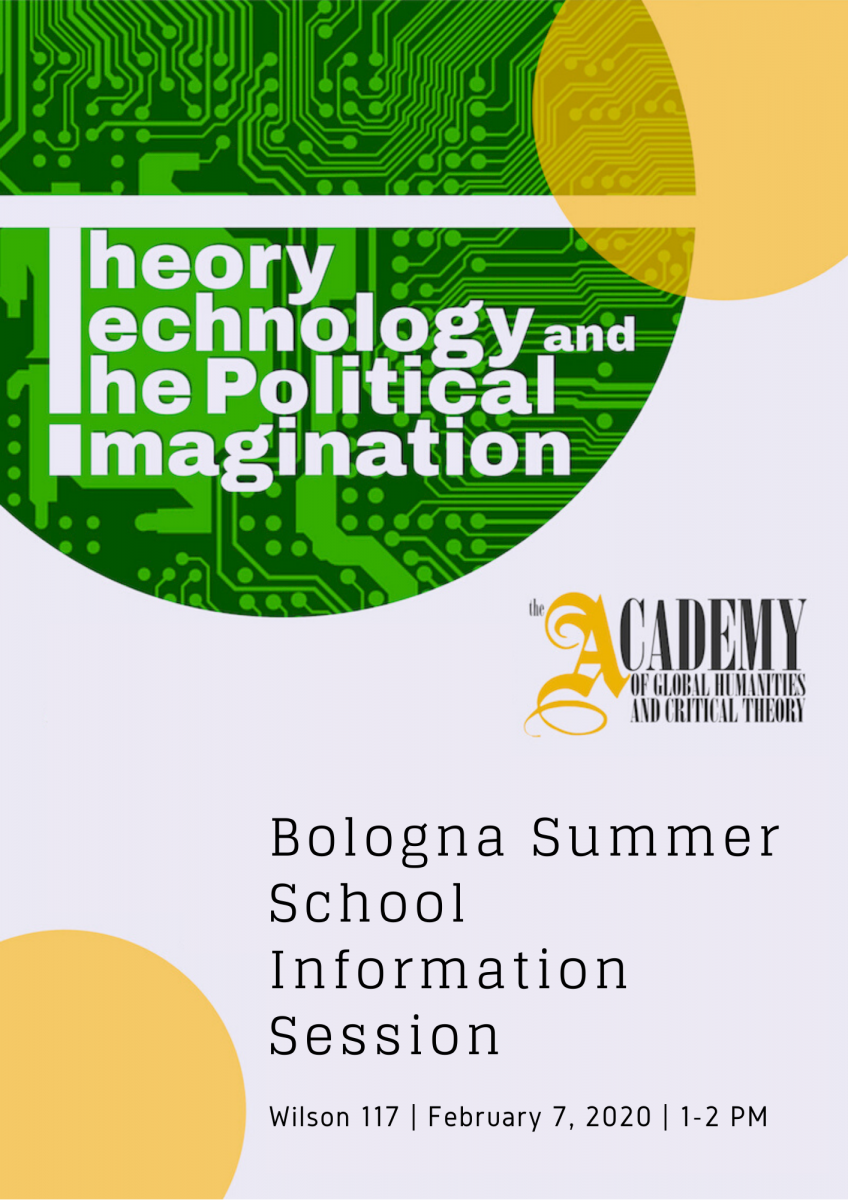
Academy of Global Humanities and Critical Theory at the University of Bologna
June 22 through July 3
A&S will fund program fees, airfare, lodging, and living expenses for a limited number of PhD students who are admitted to the 2020 Summer School of the Academy of Global Humanities and Critical Theory at the University of Bologna. This year’s topic is Theory, Technology and the Political Imagination. Information for applicants is available at http://aghct.org/how-to-apply. Applications must be submitted online by March 15th, 2020. Applicants should indicate in their statements of purpose that they are applying for an institutional grant from the University of Virginia. Applicants will be notified of selection results by April 6th
There is an information session on Feb. 7th in Wilson Hall 142 for students who wish to learn more about how to participate in this unique opportunity for intellectual and professional development.

Joan Wallach Scott, "Accounting for History: The Movements for Reparations for Slavery in the U.S."
January 30, 2020
The Dome Room, Rotunda | 4:00 PMJoan Wallach Scott, "Accounting for History: The Movements for Reparations for Slavery in the U.S."
January 30, 2020
The Dome Room, Rotunda | 4:00 PM
Reviewing the long history of demands for reparations and looking closely at the current movements, Joan Scott will argue that although material compensation is certainly part of the effort, the demand for reparations is best understood as a critique of the conventional writing of American history. It is an example of a critical politics that takes its aim at the way history represents the past.
Joan Scott is Professor Emerita in the School of Social Science in the Institute for Advanced Study in Princeton, NJ. Her groundbreaking work has challenged the foundations of conventional historical practice, including the nature of historical evidence and historical experience and the role of narrative in the writing of history. She is the author of numerous books that have been important for numerous disciplines and debates. These include Gender and the Politics of History (1988), Only Paradoxes to Offer: French Feminists and the Rights of Man (1996), Parité: Sexual Equality and the Crisis of French Universalism (2005), The Politics of the Veil (2007), The Fantasy of Feminist History (2011), Sex and Secularism (2017), and Knowledge, Power, and Academic Freedom (2018).
Prof. Scott’s visit is co-sponsored by the Institute for Humanities and Global Cultures, Political Theory: An International Journal of Political Philosophy, the Departments of Politics and of Women, Gender, and Sexuality, The Virginia Center for the Study of Religion, and the Power, Violence, and Inequality Collective.

Katherine Bode, "What's the Matter with Digital Literary Studies?"
January 22, 2020
Wilson Hall 142 | 5:30 pm - 7 pmKatherine Bode, "What's the Matter with Digital Literary Studies?"
January 22, 2020
Wilson Hall 142 | 5:30 pm - 7 pm
Pluralizing Political Thought: Introducing The Oxford Handbook of Comparative Political Theory: Murad Idris, Leigh K. Jenco, and Megan C. Thomas in conversation with Ian Baucom, Roxanne L. Euben, and Lawrie Balfour
January 16, 2020
Harrison - Small Auditorium | 16:00Pluralizing Political Thought: Introducing The Oxford Handbook of Comparative Political Theory: Murad Idris, Leigh K. Jenco, and Megan C. Thomas in conversation with Ian Baucom, Roxanne L. Euben, and Lawrie Balfour
January 16, 2020
Harrison - Small Auditorium | 16:00On January 16, the Asian Cosmopolitanisms Lab are hosting 'Pluralizing Political Thought: Introducing The Oxford Handbook of Comparative Political Theory: Murad Idris, Leigh K. Jenco, and Megan C. Thomas in conversation with Ian Baucom, Roxanne L. Euben, and Lawrie Balfour' in the Harrison Small Auditorium. The event will take place at 4pm, and will be followed by a reception.

David Nemer (UVA), "From Misinformation to Extremism: How WhatsApp Is Affording Radicalization in Brazil"
November 22, 2019
Wilson Hall 142 | 12:00 pm - 1:30 pmDavid Nemer (UVA), "From Misinformation to Extremism: How WhatsApp Is Affording Radicalization in Brazil"
November 22, 2019
Wilson Hall 142 | 12:00 pm - 1:30 pmTalk description: During the 2018 Brazilian general election, WhatsApp became a potent tool for the spread of misinformation, especially for supporters of Bolsonaro. I began monitoring pro-Bolsonaro WhatsApp groups in March 2018- at the outset of the election, the social media app eventually helped Bolsonaro win and become the president of Brazil. I found that fake news spread in typical fashion, through a structure of groups that resembled a pyramid. Now, ten months into Bolsonaro’s presidency, WhatsApp is still serving as a largely hidden platform for the radicalization of right-wing Brazilians, even as Bolsonaro’s once-united base has splintered into separate, and often competing, factions. In this talk, I uncover hidden spaces of populism and misinformation on WhatsApp and detail the social infrastructure that is radicalizing the right in Brazil.

Mellon Fellows Seminar - Ahmed al-Rahim, "Mobility and Knowledge in the Mongol Empire: The “Peripatetic School” (Madrasa-ye Sayyārā) of the Ilḫān Ūlǧāytū (r. 1304-16 A.D.)""
November 15, 2019
Wilson Hall 142 | 10:30 am - 12:00 pmMellon Fellows Seminar - Ahmed al-Rahim, "Mobility and Knowledge in the Mongol Empire: The “Peripatetic School” (Madrasa-ye Sayyārā) of the Ilḫān Ūlǧāytū (r. 1304-16 A.D.)""
November 15, 2019
Wilson Hall 142 | 10:30 am - 12:00 pmAhmed H. al-Rahim works on Arabo-Islamic intellectual and religious history from Muhammad to Avicenna to Abū-Bakr al-Baghdādī. His research and teaching cut across the centuries, spanning the Arabic reception history of Avicennan philosophy during Islam’s so-called “dark ages,” from the eleventh to the fourteenth century, the development of Islamic ethics in the Middle Ages, and the ideologies of political Islam, also known as Islamism, in the Middle East in the early nineteenth to twenty-first century. Professor al-Rahim is currently working on a history of etiquette literature and manuals of practical virtue ethics (ādāb) in Islamicate civilization, and on a short introduction to modern Islamist ideologies. His publications include: Islamic Ethics: An Introduction to the Classical Tradition, New Islamic Surveys (Edinburgh University Press, Forthcoming); The Creation of Philosophical Tradition: Biography and the Reception of Avicenna’s Philosophy from the Eleventh to the Fourteenth Century A.D., Diskurse der Arabistik; XXI (Wiesbaden: Harrassowitz Verlag, 2018); and Before and After Avicenna: Proceedings of the First Conference of the Avicenna Study Group, co-edited with D.C. Reisman, Islamic Philosophy, Theology and Science. Texts and Studies, LII (Leiden: E.J. Brill, 2003).

Crime, Security, and Citizenship: The Politics of Fingerprinting in China, 1920s - 1940s with Daniel Asen (Rutgers University)
November 15, 2019
Wilson 142 | 4:00PM - 5:30PMCrime, Security, and Citizenship: The Politics of Fingerprinting in China, 1920s - 1940s with Daniel Asen (Rutgers University)
November 15, 2019
Wilson 142 | 4:00PM - 5:30PMAn event in the Asian Cosmopolitanisms Lecture Series. Co-sponsored by the Humanities Informatics' Surveillance and Infrastructure research group.

Lucy Neave, "Environment Crisis, De-colonization and Signification in Alexis Wright’s The Swan Book
November 7, 2019
Wilson Hall 142 | 12:00 pm - 1:30 pmLucy Neave, "Environment Crisis, De-colonization and Signification in Alexis Wright’s The Swan Book
November 7, 2019
Wilson Hall 142 | 12:00 pm - 1:30 pmAlexis Wright’s The Swan Book focuses on an Australian Aboriginal woman character named Oblivia, who emerges after a ten-year period of a trauma-induced ‘sleep’ in the ‘deep underground bowel of a giant eucalyptus tree’ where she writes ‘stanzas in ancient symbols’ (7). The setting of the novel is an imagined future of cataclysmic climate change, as well as an unresolved and ongoing settler past and present, in which First Nations people experience pervasive mental and affective colonization. Oblivia and other occupants of the polluted Northern Australian swamp where she lives, desire survival and connection with their ancestral lands.The novel’s narrative is inextricably bound up with images and texts pertaining to colonial pasts and also indigenous forms of storytelling. The swans who come to the swamp as refugees of climate change, exist as intertextual entities. This talk examines the extent to which the swans in the novel and Oblivia’s relationship with them dramatize questions around the ravages of settler colonialism and environmental crisis.
Biographical Note
Lucy Neave is conducting research for a book: Crisis, Kinship and the Animal in Twenty-First Century Literature (working title). She is the author of a series of papers on the representation of animals in contemporary literature, and a novel, Who We Were (Text Publishing, Melbourne, 2013), as well as short fiction. In spring 2019, she is a visiting scholar in the New York University department of English and Comparative Literature. She teaches creative writing and literary studies at the Australian National University.

Rotunda Planetarium: Public Symposium & Event
November 1, 2019
Rotunda Dome Room | 2:00 pm - 8:30 pmRotunda Planetarium: Public Symposium & Event
November 1, 2019
Rotunda Dome Room | 2:00 pm - 8:30 pm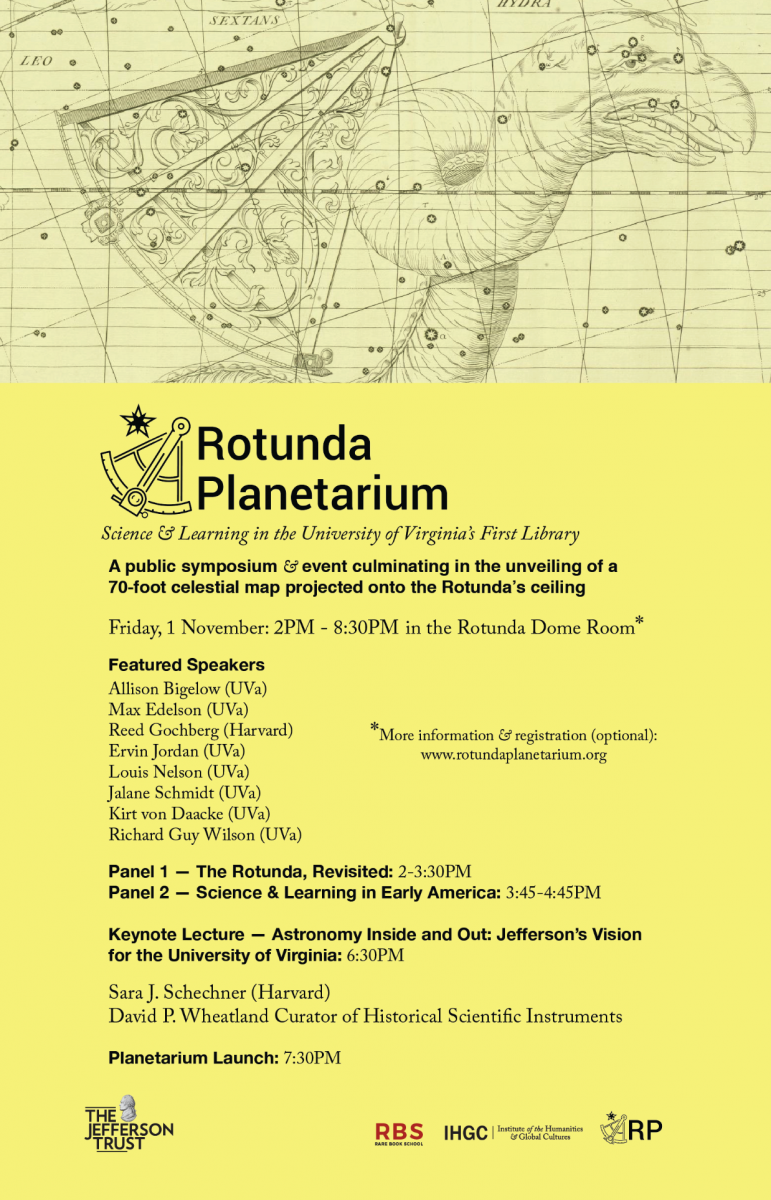
Rotunda Planetarium Launch & Symposium
Announcing "Rotunda Planetarium: Science & Learning in the University of Virginia's First Library," a public symposium culminating in the unveiling of the Rotunda Planetarium sky map projection. The symposium will be held on Friday, 1 November, 2019 in the Rotunda's Dome Room from 2PM until 8:30PM. Dean and University Librarian John Unsworth will deliver opening remarks; Sara J. Schechner, David P. Wheatland Curator of Historical Scientific Instruments at Harvard, will give the keynote lecture at 6:30PM; and the launch of the sky map projection will follow at 7:30PM. Light snacks and beverages will be provided. Please feel free to circulate this announcement widely!
Registration preferred. To learn more or to register (optional), visit www.rotundaplanetarium.org/event/symposium/
Featured speakers include: Allison Bigelow, Max Edelson, Reed Gochberg, Ervin Jordan, Louis Nelson, Jalane Schmidt, Kirt von Daacke, & Richard Guy Wilson.
The first panel, "The Rotunda, Revisited," will begin at 2PM; the second panel, "Science & Learning in Early America," will follow at 3:45PM.

Virginia Film Festival: Middle Eastern & South Asian Sidebar
October 23, 2019
Various |Virginia Film Festival: Middle Eastern & South Asian Sidebar
October 23, 2019
Various |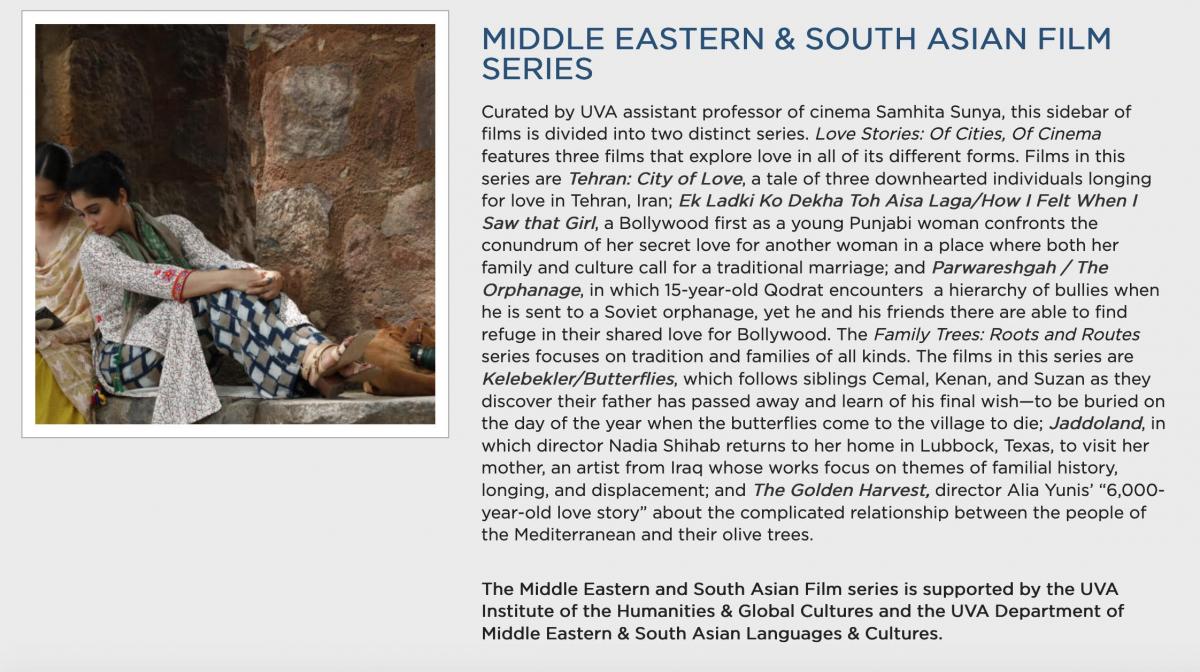
Link for viewing trailers, descriptions, and screening information, and for reserving tickets -https://virginiafilmfestival.

The Contextual: A Rethinking of the Universal with Maria Heim (Amherst College)
October 14, 2019
Wilson 142 | 4:00PM - 6:00PMThe Contextual: A Rethinking of the Universal with Maria Heim (Amherst College)
October 14, 2019
Wilson 142 | 4:00PM - 6:00PMAn event in the Asian Cosmopolitanisms Lecture Series
A.K. Ramanujan’s classic essay, “Is there an Indian way of thinking?” contrasts what he says are the West’s universalist and classical India’s contextualist/particularist ways of thinking. Using this as a point of departure, I query the assumptions that inform this contrast: the universal and the particular can be read in alternative and dialectical ways such as in Pali Buddhist practices of treating textual contextualization as itself an expression of universalism. I do this by looking at the relationship between two conceptions, the Buddha’s omniscience and textual infinity.
